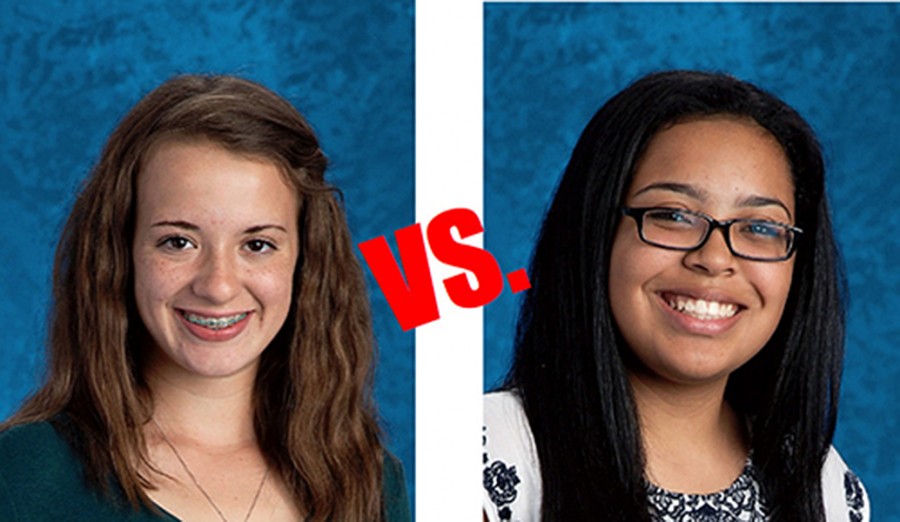Writers speak out about proposed speech restrictions
Danielle Ruiz VS. Rebecca Covington
Danielle Ruiz: “Safe speech zones, or areas in which potentially offensive speech is restricted… should definitely not be established.”
Safe speech zones, or areas in which potentially offensive speech is restricted, have been proposed on college campuses nationwide to help protect college students from racial comments and jokes. These zones should definitely not be established.
Campuses have been receiving complaints from students (primarily of color) who feel offended by the use of inappropriate remarks about race, ethnicity, and even religion by other young adults attending the school. Some say students have taken their freedom of speech too far. They’re constantly speaking their opinions, frequently at inappropriate times. Insensitivity in daily college life has caused many young adults to protest and take certain instances to court.
For example, an Asian-American student association raised awareness of the inappropriate remarks and insults that were spoken through the halls at Brandeis University. On the other hand, students at Yale University feel that speech restrictions, even when implemented to keep others from feeling offended, violate speech protections guaranteed under the First Amendment.
Although it might seem like these zones will benefit and help those students who feel personally attacked, the truth is that these zones will not take away the prejudice or cruel mendacity of their peers. Students must have the common sense to hold their tongues and refrain from saying offensive things. The offended cannot possibly think that all of their problems will be solved by this single action. Prejudice and racism are truly everywhere. It is naive to think that a safe speech zone will end these insults. In addition, these protestors are college students. They’re adults. They should be mature enough to stand up for themselves and ignore the immaturity and ignorance of others. In addition to the simple childishness and ignorance of such an idea, creation of these safe zones may also cause further controversy, as students will feel that their First Amendment guarantee is being violated. Protests and rebellion may start as a result. What was established to create a source of refuge will surely complicate the situation more.
It is sad that people today lack the common sense and racial tolerance that everyone should posses. Sure, the First Amendment doesn’t make these judgments and cruelties OK. However, it does protect other’s right to speak whatever is on their minds, be it good or bad. These safe zones are unnecessary and unconstitutional. We should enforce good character and virtue in America’s children. We need to minimize their ignorance as much as possible, not simply cause them to keep it to themselves.
Rebecca Covington: “Universities should implement safe spaces where students… are not allowed to say offensive and hateful speech.”
With colleges more diverse than ever, the line between free and offensive speech has been under dispute. In order to help address this problem, universities should implement safe spaces where students and faculty are not allowed to say offensive and hateful speech.
Recently, college campuses have experienced large student protests claiming that the colleges promote a negative environment that harms minority students and their ability to learn. The protesters have suggested that colleges create areas where disagreeable and offensive speech is banned and punishable.
College campuses have become melting pots in recent years, exposing students to different races, ethnicity, religions, and sexual orientations. Students need to understand how to live with different views and respect others, a trait vital to surviving in the real world. While their words and attitudes might not have offended anyone in the past, each individual student receives and interprets words and gestures differently. Things that may seem normal for one group of people might be offensive to others. The problem has gotten out of control and needs to be handled. The law actually provides universities with the ability to handle it. In the case of Bethel vs. Fraser, the Supreme Court ruled that schools did have the right to prohibit “lewd and obscene speech.” The rule against indecent and profane speech exists so that students can feel safe and comfortable in their environment. Colleges should have the same rules applied. A campus becomes a student’s home for four years, and students have every right to feel protected and not have to suffer the effects of racist, sexist, and inappropriate behavior.
While free speech is an essential right within our country – allowing the students to protest for this cause in the first place – it is often taken too far. The First Amendment only applies when it is not infringing on other’s rights, such as the right to safety. The discussion over free speech is just a way to avoid talking about the real issue: internalized racism. Generations have been not willing to expand their minds or question their beliefs.
With safe spaces, colleges will be more inviting, and students will prosper in the new environment. The no-tolerance policy for offensive speech will not only discourage students from being offensive, but it will teach them to be more accepting and respectful. Colleges and universities should implement these rules to keep students safe and better future generations.


